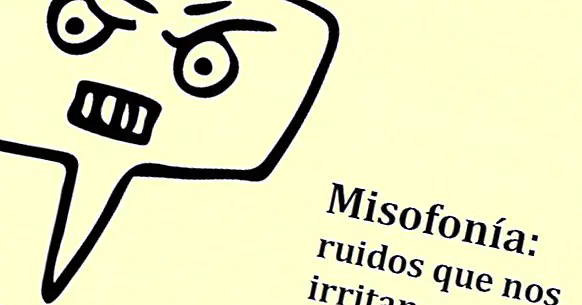Misofonía: the hatred to certain irritating sounds
The list of mental alterations that can harm our quality of life grows as cases of patients afflicted by problems difficult to conceive long ago are known.
Misophony, or selective sensitivity to low intensity sounds It could be one of the new mental disorders to be added in diagnostic manuals such as DSM.
What is the misophony?
Misophony, which means "hate to sound", is described as a mental disturbance that occurs when low intensity daily sounds produce too much discomfort . The fact of hearing how someone chews, the sound of a ballpoint pen slipping on paper or the sound emitted by certain people wearing rubber soles when walking on a smooth surface can be a torture for people with some form of misophony, since that have very little tolerance to certain types of auditory stimuli.
Thus, where there is misophony there is a tolerance threshold too low to certain low intensity noises, which causes these to trigger a state of stress, anger and strong discomfort in the person experiencing it, depending on the type of noise to which dislike him: the noise when chewing, the clearing of a throat-clearing person, etc.
The consequences of "hate to sound"
People with misophonia are distinguished from the rest of the population to the degree that they feel discomfort from everyday sounds that are not heard loud enough to damage the auditory system and generate pain. Many people may notice that "they get angry" often hear how your partner chews, but people with misophony come to feel so bad by certain kinds of sounds that are able to change their habits to not have to listen to them, which often it leads them to isolate themselves in an area they consider safe, or to use earplugs in certain contexts.
In addition, as the connection between the auditory stimuli and the appearance of the state of discomfort is so direct, many times they become suddenly in a bad mood , which can produce discussions in the family environment or in the circle of friends.
Possible new mental disorder
The first time someone used the term "misophony" was in the year 2000, when neuroscientists Pawel and Margaret Jastreboff described a psychological alteration characterized by a low tolerance to specific sounds . Because of the recentness of this concept, its causes and the level of incidence it has on the population are currently unknown. However, it is believed that its cause is in the brain, where the activation of neurons associated with an auditory stimulus would be associated, in turn, to a stressful or irritating experience. For the time being, it has been experimentally demonstrated that people with misophony show a greater electrical conductivity in their skin when they are exposed to the sounds they find stressful, something that does not happen with the rest of individuals. It is an immediate physiological reaction.
In addition, the severity of certain cases of misophony has led to several researchers advocating the idea that this phenomenon should be included in the diagnostic manuals of mental disorders in order to easily identify this disorder and develop research and treatment programs. on a consensual basis.
At the moment, a tool has already been developed to help identify the cases of patients with misophonia, the Misophonia Activation Scale, with 11 degrees of intensity in the symptoms: from the absence of discomfort when listening to a sound to the use of violence unleashed by the strong discomfort produced by a noise.
Treatment for misophony
Like what happens with tinnitus, the treatment proposals for misophony cases are based on proposing strategies to coexist with this alteration, either through cognitive-behavioral therapy or teaching specific strategies to protect themselves from the sound that produces aversion without affective and family life being severely impaired.
Until a solution is discovered to make the symptoms disappear, the intervention focuses on teaching coping strategies and on ensuring that the family, friends and co-workers of the person with misophony are aware of their needs and know what to do. do in each case.



















